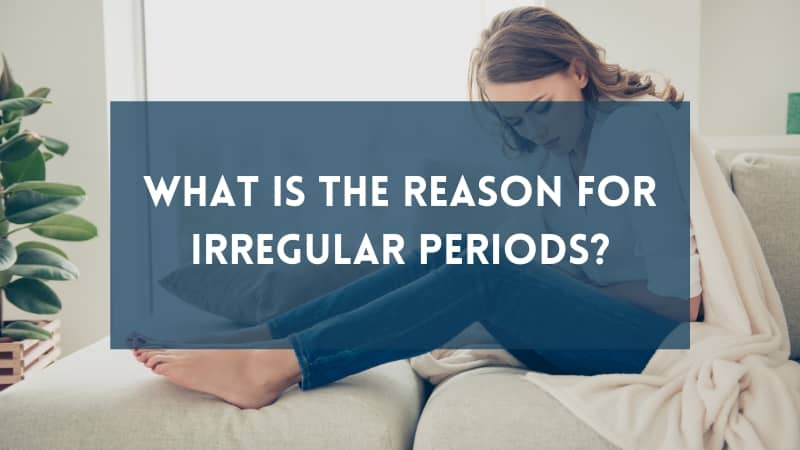This article talks about irregular, delayed, and missed periods and every bit of information around them. We focus on what is the reason for irregular periods, symptoms of irregular periods, irregular period causes, and the treatment for the same.
What is an Irregular Period?
Typically, the duration of the menstrual cycle is 22-35 days starting from the first day of the last period till the first day of the next period. Usually, 5-7 days of variation in the menstrual cycle is considered acceptable. If the variation is more than 8 days and this irregularity is there 2-3 times a year, it is termed as the period irregularity and needs to be investigated to determine the root cause.
Symptoms of Irregular Periods
The symptoms of irregular periods may include:
- Spotting or bleeding between the periods
- Heavy bleeding during the period that lasts for than a week
- Bleeding that lasts longer than normal
- Bleeding after menopause
- Bleeding after sexual intercourse
- Having periods more than 35 days apart
- Not having periods for at least 3 menstrual cycles
- Appearance of clots appear that are more than 2.5 cms in diameter
- Having periods less than 21 days apart
The Menstrual Cycle Hormones
The menstrual cycle is entirely regulated by 4 important hormones:
- Luteinizing Hormone
- Follicle Stimulating Hormone
- Estrogen
- Progesterone
Luteinizing Hormone (LH) and the Follicle Stimulating Hormone (FSH) are produced by the pituitary gland. This is a small pea-sized gland located in the base of the brain that plays a major role to regulate vital body functions. It is also called the 'master gland' as it is responsible for controlling the activity of other hormone-secreting glands. The function of these hormones is to promote ovulation (i.e. develop and release eggs in the ovary) and stimulate the ovaries to further produce Estrogen and Progesterone. Estrogen and progesterone stimulate the uterus and breasts and prepare the body for possible fertilization or pregnancy.
The menstrual cycle has three phases:
- Follicular/Pre-Ovulatory Phase (before the release of the egg)
- Ovulatory (egg release)
- Luteal/Post-Ovulatory/Secretary Phase (after egg release)
The Follicular Phase
Typically, the follicular phase begins on the first day of the period and ends when a woman ovulates. This phase starts when the hypothalamus gland (located in the brain) sends a signal to the pituitary gland to release the FSH. This FSH hormone stimulates the ovaries to produce about 5-20 tiny sacs called follicles. Each follicle contains an immature egg. Normally, only the healthiest of the eggs eventually matures (though in some rare cases, a woman may have two eggs mature). The rest of the follicles are reabsorbed by the body. The maturing follicle increases the level of Estrogen that thickens the lining of the uterus to create an environment for the embryo to grow.
This entire follicle phase lasts for about 16 days on average and can range from 11 to 27 days.
The Ovulatory Phase
The increased estrogen levels during the follicular phase trigger the pituitary gland to produce another hormone, the LH. This triggers the process of ovulation. It is the only time when a woman can get pregnant. During this phase, the ovary releases the matured egg. This egg travels down the fallopian tube towards the uterus to be fertilized by a sperm. A woman may experience symptoms in this phase such as a slight rise in basal body temperature or thick discharge with a texture similar to that of egg whites.
Ovulation happens in the middle of the menstrual cycle (for instance, ovulation will happen on day 14 if you have a 28-days cycle). Generally, it lasts about 24 hours. After this, the egg dies or dissolves if it is not fertilized by the sperm.
The Luteal phase
When the follicle releases its egg, it is called the corpus luteum. This produces the hormone called Progesterone and the rise in Progesterone prepares the uterus for pregnancy. Therefore, the Estrogen works to keep the uterine lining thick and the Progesterone makes it ready for a fertilized egg to implant.
If the pregnancy happens, the body will produce human chorionic gonadotropin (hCG) which is detected by the hormone pregnancy tests. hCG helps to maintain the corpus luteum and keeps the lining of the uterus thick.
If the pregnancy does not happen, the corpus luteum will shrink and be reabsorbed by the body. This decreases the levels of Estrogen and Progesterone in the body and the uterine lining will shed in the form of a monthly period.
Typically, the luteal phase lasts for 11 to 17 days and 14 days on average.
The length of the follicular phase is variable as the eggs may develop slowly or may take a long time. This increases or decreases the length of this phase. On the other hand, the length of the luteal phase is fixed. Hence, the length of the menstrual cycle depends on the length of the follicular or the pre-ovulatory phase and this disturbs the ovulation. If the ovulation happens late, is irregular, or is not happening at all, it will have a direct impact on the length of the menstrual cycle.
What is the Reason for Irregular Periods – The Irregular Periods Causes
Irregular periods are quite common but what is the reason for irregular periods? It can be attributed to several factors, from hormonal imbalance to other underlying medical conditions.
1. Pregnancy
If a woman is pregnant, she will not get her period. Pregnancy may result in a missed period or spotting.
2. Lactation/Breastfeeding
A woman’s body releases a hormone, prolactin when she is breastfeeding. Prolactin suppresses the reproductive hormones resulting in no bleeding or light bleeding.
3. Polycystic Ovary Syndrome (PCOS/PCOD)
Having irregular periods is the most common sign of PCOS/PCOD. However, along with this, a woman may experience other symptoms such as increased facial and body hair or weight gain.
NewMumLife team’s interaction with Dr. Neelu Khanna, Consultant Gynecologist, on everything you need to know about PCOD.
Another interaction with Dt. Shifali Mehra on the diet plan to cure PCOD permanently.
4. Perimenopause
This is the transition phase before periods are about to stop and usually begins in the 40s. During this time, the Estrogen levels fluctuate and the periods may become irregular. A woman may experience certain symptoms such as hot flashes, night sweats, mood swings, difficulty sleeping, or vaginal dryness.
5. Thyroid
Hypothyroidism (low levels of thyroid) may cause long and heavy periods with increased cramping. Hyperthyroidism (high levels of thyroid hormones) may result in light and short period cycles.
6. Infections
Pelvic inflammatory disease (PID) and other infections can also cause irregular periods. There are many symptoms including bleeding between periods or after intercourse.
7. Stress
Stress interferes with the part of the brain that controls hormones that are responsible to regulate your cycle. This disturbs the menstrual cycle and causes the periods to be irregular.
8. Uterine Fibroids
Fibroids may result in periods that are painful and extremely heavy, thus causing a lot of discomfort to the woman.
9. Premature Ovarian Failure
Normally, menopause happens after the age of 38 years. If it happens before this age, it is termed premature menopause. This is due to several factors such as if a woman has undergone Chemotherapy and radiation therapy, autoimmune disease, or some other genetic disorders.
10. Weight Gain/Obesity
Weight gain and being overweight affect the hormones and insulin levels, which in turn interferes with the menstrual cycle and makes the periods irregular.
11. Excessive Exercise
Women who pursue intense workouts or physical activities often experience missed or stopped periods. Excessive exercising disturbs the levels of hormones responsible for menstruation.
12. Medications
Certain medications may interfere with your menstrual cycles such as blood thinners, thyroid medications, epilepsy drugs, antidepressants, chemotherapy drugs, aspirin, and ibuprofen.
13. Endometriosis
Wherein the tissue that lines the uterus grows outside the uterus. This may result in heavy bleeding, prolonged periods, and bleeding between periods.
14. Cervical and Endometrial Cancer
These may affect your menstrual cycle causing bleeding between periods or heavy periods.
15. Being Underweight
Losing weight or being underweight may cause your period to stop altogether. Low consumption of calories interferes with the production of the hormones needed for ovulation.
16. Hormonal Birth Control Pills
The use of hormonal birth control pills or hormone-containing IUDs can cause breakthrough bleeding, spotting between periods, or much lighter periods.
The Treatment - Ways to Tackle the Irregular Periods
- Maintain sleep hygiene. Adequacy, timing, and quality of sleep are extremely important to keep the hormones balanced.
- Irregular periods during puberty or menopause do not need any treatment and are perfectly normal.
- If irregular periods are experienced after using birth control options, immediately talk to your healthcare provider.
- In case of emotional stress, psychological therapy may help. You can pursue relaxation techniques, stress management, and talk to your therapist.
- For any underlying medical condition such as PCOD or thyroid, talk to your healthcare provider.
- Avoid junk, packaged, and processed food. Consume fresh fruits and vegetables that are seasonal and local.
- Lower the use of plastics as plastic containers contain a compound Xeno Estrogen that mimics the action of Estrogen in the body.
- Exercise regularly that is sustainable and should not be intense. Strive to maintain a healthy weight. Yoga is also considered extremely beneficial in treating many types of health-related issues.
- Destress yourself in the form of reducing work pressure, doing regular exercise, meditation, or pursuing yoga. Whatever activity you follow should soothe your mind and body.
- Maintain a basic BMI (basic metabolic index). This depends entirely on your exercise and diet. Binge eating is not acceptable and you should never resort to a crash diet.
- Certain home remedies are considered extremely useful. Consumption of ginger and cinnamon is helpful to relieve menstrual cramps and heavy bleeding. Green tea has also been identified to reduce menstrual cramps.
- Vitamin D deficiency is associated with causing irregular periods. Get your Vitamin D levels checked and take supplements if required.
Naturally, a woman was never prepared to have irregular periods. If we talk about what is the reason for irregular periods, we can say that today’s lifestyle changes, work pressures, health issues, or dietary habits are the major factors responsible for this irregularity. Every other woman has been identified to experience the problem of irregular periods. There are several irregular periods causes, but most of the time, irregularity is normal and can be tackled with certain lifestyle changes. So, give yourself some time and love and pamper yourself. Always remember, if you are happy, only then you can make others happy. So, be happy and keep glowing!
About The Author

Dr. Parneet Kaur
Dr. Parneet Kaur is a Consultant Obstetrician and Gynaecologist and is currently working in IVY Hospital, Mohali. She also runs her private clinic. With her tender loving care, Dr. Parneet is an expert in High Risk Pregnancy Management and Adolescent Gynecology and deals with teenage gynaecological problems. Recurrent Miscarriages, Urogynecology and Subfertility are dealt with utmost expertise and latest treatments.
Read More

